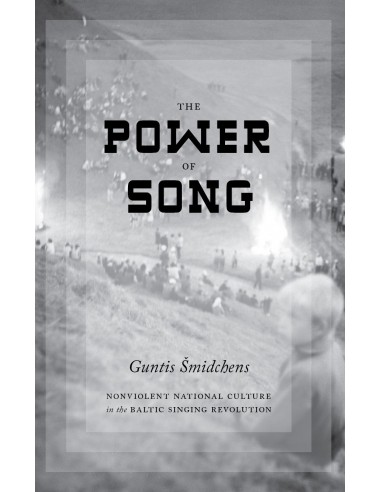Your cart
Der er ikke flere varer i din indkøbskurv
Nonviolent National Culture in the Baltic Singing Revolution
The Power of Song shows how the people of Estonia, Latvia, and Lithuania confronted a military superpower and achieved independence in the Baltic "Singing Revolution". When attacked by Soviet soldiers in public displays of violent force, singing Balts maintained faith in nonviolent political action.
As an inspiration to all nations, the nonviolent Baltic independence movement revolutionized each country through singing and smiling. The "Singing Revolution" is indeed the essence of the Baltic way, and began in 1987 as a public revolt against Soviet restrictions on free speech and assembly. The revolutions and following elections in 1990 resulted in three separate governments and a declaration of independence from the Soviet Union.
The Power of Song seeks to answer questions such as why the struggle for Baltic independence came to be called the Singing Revolution? What did they sing? And what role did singing play in the Estonian, Latvian, and Lithuanian campaigns of political mobilization and nonviolent action? Furthermore, and uniquely for this publication, it explores, in great depth, the songs that gave the revolution its name, translating and interpreting more than 110 choral, rock, and folk songs in their poetic, cultural, and historical context.
Guntis Smidchens is the Kazickas Family Endowed Professor in Baltic Studies in the Scandinavian Studies Department at the University of Washington.
As an inspiration to all nations, the nonviolent Baltic independence movement revolutionized each country through singing and smiling. The "Singing Revolution" is indeed the essence of the Baltic way, and began in 1987 as a public revolt against Soviet restrictions on free speech and assembly. The revolutions and following elections in 1990 resulted in three separate governments and a declaration of independence from the Soviet Union.
The Power of Song seeks to answer questions such as why the struggle for Baltic independence came to be called the Singing Revolution? What did they sing? And what role did singing play in the Estonian, Latvian, and Lithuanian campaigns of political mobilization and nonviolent action? Furthermore, and uniquely for this publication, it explores, in great depth, the songs that gave the revolution its name, translating and interpreting more than 110 choral, rock, and folk songs in their poetic, cultural, and historical context.
Guntis Smidchens is the Kazickas Family Endowed Professor in Baltic Studies in the Scandinavian Studies Department at the University of Washington.
- Forfatter
- Guntis Šmidchens
- ISBN13
- 9788763541480
- ISBN10
- 8763541483
- Udgave /år
- 1 / 2014
- Forlag
- Museum Tusculanum
- Sidetal
- 456
- Indbinding
- Hardback

